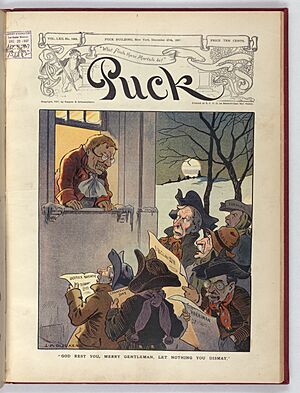God Rest Ye Merry, Gentlemen para niños
God Rest Ye Merry, Gentlemen es un himno cristiano muy antiguo y un villancico tradicional de Navidad. Se canta en un estilo musical llamado modo eolio.
Contenido
Historia de "God Rest Ye Merry, Gentlemen"
¿Cuándo se publicó por primera vez?
Este villancico se publicó por primera vez en Inglaterra en el año 1823. Apareció en un libro llamado Christmas Carols Ancient and Modern (Villancicos de Navidad Antiguos y Modernos). Este libro fue una colección de canciones reunidas por William B. Sandys.
¿Quién escribió este villancico?
El autor original de "God Rest Ye Merry, Gentlemen" no se conoce. En aquella época, las palabras de la canción tenían un significado un poco diferente al que les damos hoy. Por ejemplo, la palabra rest significaba "guardar" o "mantener", no "descansar". Y merry quería decir "fuerte" o "poderoso", no "alegre".
¿A quién se cantaba esta canción?
Aunque el título menciona "gentlemen" (caballeros), la canción no estaba dirigida a personas valientes o de alta sociedad. Más bien, era cantada por los guardianes de la ciudad a los pequeños propietarios de casas. Estos guardianes buscaban ganar un poco de dinero extra durante la temporada navideña.
¿Aparece en alguna historia famosa?
Sí, este villancico aparece en la famosa historia Un canto de Navidad de Charles Dickens. En el relato, el personaje de Scrooge escucha el himno. Él reacciona de forma brusca con la persona que lo canta, haciéndola huir.
Letra del Villancico
Aquí puedes leer la letra de este tradicional villancico:
- God rest ye merry, gentlemen
- Let nothing you dismay
- for Jesus Christ our Saviour
- Was born upon this day (or Was born on Christmas Day)
- To save us all from Satan's power
- When we were gone astray
- O tidings of comfort and joy,
- Comfort and joy
- O tidings of comfort and joy.
- In Bethlehem, in Israel,
- This blessed Babe was born
- And laid within a manger
- Upon this blessed morn
- The which His Mother Mary
- Did nothing take in scorn
- O tidings of comfort and joy,
- Comfort and joy
- O tidings of comfort and joy.
- From God our Heavenly Father
- A blessed Angel came;
- And unto certain Shepherds
- Brought tidings of the same:
- How that in Bethlehem was born
- The Son of God by Name.
- O tidings of comfort and joy,
- Comfort and joy
- O tidings of comfort and joy.
- "Fear not then," said the Angel,
- "Let nothing you affright,
- This day is born a Saviour
- Of a pure Virgin bright,
- To free all those who trust in Him
- From Satanás's power and might."
- O tidings of comfort and joy,
- Comfort and joy
- O tidings of comfort and joy.
- The shepherds at those tidings
- Rejoiced much in mind,
- And left their flocks a-feeding
- In tempest, storm and wind:
- And went to Bethlehem straightway
- The Son of God to find.
- O tidings of comfort and joy,
- Comfort and joy
- O tidings of comfort and joy.
- And when they came to Bethlehem
- Where our dear Saviour lay,
- They found Him in a manger,
- Where oxen feed on hay;
- His Mother Mary kneeling down,
- Unto the Lord did pray.
- O tidings of comfort and joy,
- Comfort and joy
- O tidings of comfort and joy.
- Now to the Lord sing praises,
- All you within this place,
- And with true love and brotherhood
- Each other now embrace;
- This holy tide of Christmas
- All other doth deface.
- O tidings of comfort and joy,
- Comfort and joy
- O tidings of comfort and joy.


